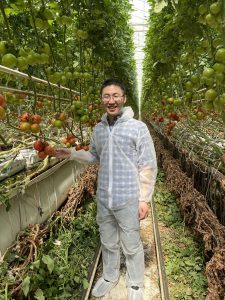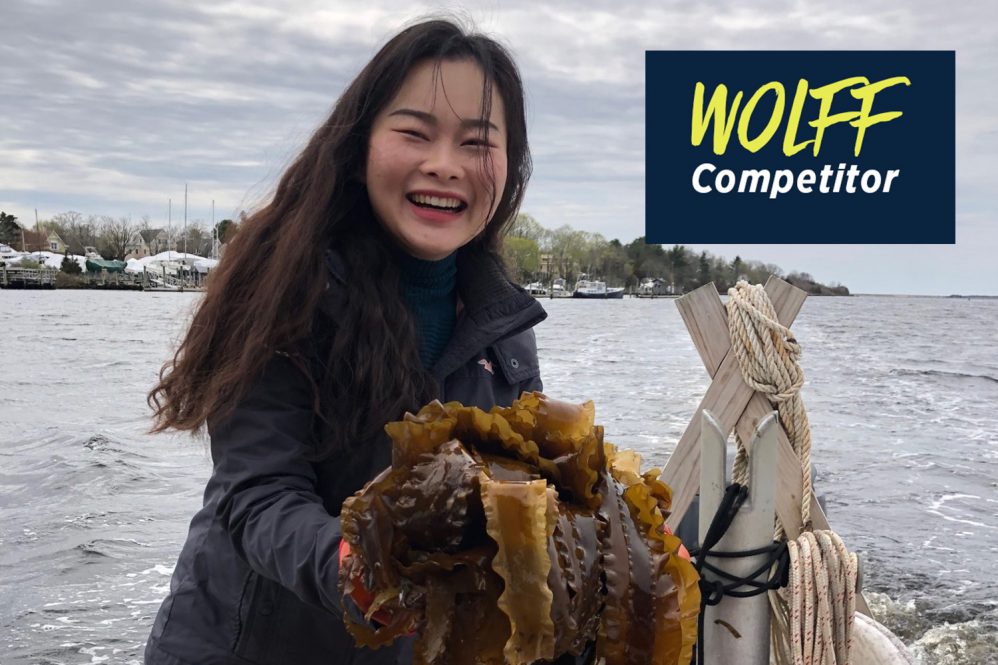Who hasn’t purchased a pint of mouthwatering strawberries and two days later had to toss it in the trash because the berries became mushy and moldy?
A staggering one of every three pieces of fresh produce ends up in the garbage, a frustration for farmers, grocers, and consumers alike.
But a team of UConn scientists think they have a solution. Their startup, Atlantic Sea Solutions, is using seaweed extracts as a coating for peaches, berries and other fresh produce. They believe the natural ingredient can double the shelf-life of perishable foods by reducing shrinkage and spoilage. The seaweed-coating can be applied without changing the flavor or texture of the food.
“What I love about my work and what motivates me is using science and technology to do cool things with food,’’ says Anuj Purohit, a research associate in the Department of Nutritional Sciences in the College of Agriculture, Health and Natural Resources, food scientist, and co-founder of the company.
“To be involved in something that combats food loss and food waste is just incredible. The world is trying to find solutions to this problem and there has been progress, but there is so much more to be done,’’ he says. “The world population is growing, and we all need good, nutritious food. That’s what drew me to agriculture and what keeps me going.’’
Company Vying for Wolff New Venture Prize
Atlantic Sea Solutions is one of five UConn-affiliated startups competing in the Wolff New Venture Competition on Oct. 1 in downtown Hartford. Now in its ninth year, the event is the School of Business’ pinnacle entrepreneurship challenge. The competition will award more than $70,000 in prize money, with the first-place finisher receiving a $30,000 check.
New this year, a startup showcase is being added alongside the pitch competition. Thirty UConn startups, including companies like Bastion Health, PatentPlus, and Phoenix Tailings, will be exhibiting their technologies, products and services. Attendees will be able to purchase items from the startups that sell consumer products.
The potential of Atlantic Sea Solutions earned the company an invitation to the Connecticut Center for Entrepreneurship & Innovation’s (CCEI) Summer Fellowship Accelerator this year, and it was an experience that Purohit relished. Although he had some background in business, and had worked for a startup in the past, he says he had much to learn.
“Creating a company is very, very daunting, but at the same time it keeps life interesting,’’ he says.

CCEI helped Atlantic Sea Solutions develop concise and effective communication about the company, establish go-to-market strategy, refine its business model, and meet many mentors in the business community.
“Now we can stand in front of potential investors and explain why the world should care about what we do and how they could help,’’ Purohit says. The team also includes UConn assistant professor of innovation and entrepreneurship in the Department of Nutritional Sciences and co-founder Mingyu Qiao; industry expert and co-founder Matthew Cleaver; UConn Ph.D. student Yidan Zhang; and summer intern Andrew Carter ’26 (BUS).
Although Atlantic Sea Solutions faces competition from other startups trying to combat the food-waste problem, Purohit says the UConn company is in its own league because seaweed is organic, plentiful, inexpensive, and sustainable. He and the team are confident in their technology and hope to be able to offer their formula to fresh produce growers.
If they win the grand prize at the Wolff competition, they will use the award money to purchase additional equipment. Beyond fruit, Purohit and his team believe they can expand into treating vegetables, mushrooms, and perhaps even meat.
For a company that was founded just 18 months ago, the progress has been incredible, he says.
“We feel good about our progress. There is a market need for this improvement and our process is very niche. Our goal is to salvage produce, which would reduce costs and incentivize people to eat more of it. People aren’t consuming as much fresh produce as they should,’’ Purohit says.
“The role of UConn and CCEI has been pivotal to getting this technology where it is,’’ he says. “When we started this project, I was given a great deal of creative freedom, virtually a blank slate. That creative and technical autonomy was priceless to me. I felt like a kid in a candy store!’’
The Wolff New Venture Competition will be held on Oct. 1 from 5:30 to 8:30 p.m. at the YG Club at Dunkin Park in Hartford. The event is free to attend and all are welcome. Please pre-register at https://ccei.uconn.edu/wolff-new-venture-competition/.
The Wolff New Venture Competition is supported thanks to the generosity of the Wolff Family Fund for Strategic Entrepreneurship, as well as wiggin(x), Santander, Sardilli Produce and Dairy, Prime Materials Recovery Inc., Webster Bank, Fiondella, Milone and LaSaracina CPAs, Baystate Financial, Mark and Jamie Summers, and Event Resources.



